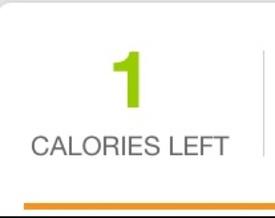Subtract BMR from exercise calories?

CMmrsfloyd
Posts: 2,371 Member
I was wondering, does anyone subtract their BMR rate from their exercise calories before entering them? MFP calculates my BMR as 1365 calories/day which is about.57 calories per hour. If I work out for an hour and burn around 600 calories, should I be subtracting the 57 that I would have burned doing absolutely nothing (which is already accounted for in e calorie goal that MFP gives me)? Is this a good idea or am I totally over analyzing this situation? I only have 18 lbs left to lose so I kind of want to be as accurate in my calorie counting (both food and exercise) as possible. I use my Polar FT4 when working out. I've been just entering the number that it gives me, but now I'm wondering if it kind of already takes the BMR rate into account or if I should subtract it myself to get the most accurate idea of what I'm really accomplishing. I know it doesn't seem like a big thing but I don't want to overestimate my exercise calories.
I'm probably way over analyzing this. Give me some opinions please. :-)
I'm probably way over analyzing this. Give me some opinions please. :-)
0
Replies
-
I don't because a) I only measure the calories from while I am exercising, not for the time my HR is elevated after, and b) I don't log the several miles I walk a day, so I should have a little leeway.0
-
YES!!! I do and always have because it makes perfect sense in my brain, I don't think you are overanalyzing at all. In fact as you get within 20 pounds of your goal weight it becomes very important to be accurate and this is part of it. I noticed that of my friends...the ones who do not do this plateau more often and are more frustrated cause they can't understand why!
Well, I know why!
Best of luck and yes take off the 57 per hour and eat back the rest. Weigh your foods so this is accurate too and you will be successful no doubt!0 -
I was wondering, does anyone subtract their BMR rate from their exercise calories before entering them? MFP calculates my BMR as 1365 calories/day which is about.57 calories per hour. If I work out for an hour and burn around 600 calories, should I be subtracting the 57 that I would have burned doing absolutely nothing (which is already accounted for in e calorie goal that MFP gives me)? Is this a good idea or am I totally over analyzing this situation? I only have 18 lbs left to lose so I kind of want to be as accurate in my calorie counting (both food and exercise) as possible. I use my Polar FT4 when working out. I've been just entering the number that it gives me, but now I'm wondering if it kind of already takes the BMR rate into account or if I should subtract it myself to get the most accurate idea of what I'm really accomplishing. I know it doesn't seem like a big thing but I don't want to overestimate my exercise calories.
I'm probably way over analyzing this. Give me some opinions please. :-)
lolx you are too good in maths0 -
I used to when my weight was higher and I was burning more more minute. Now I don't but I leave a little wiggle room with eating back my calories to account for it.0
-
Yes, you are over analyzing it but I do the same thing and I don't think there is anything wrong with it
 ! I think it's just a personal choice. I eat my exercise calories back so it doesn't make sense to me to eat those calories twice (once calculated into my BMR and then again in the exercise calories). 0
! I think it's just a personal choice. I eat my exercise calories back so it doesn't make sense to me to eat those calories twice (once calculated into my BMR and then again in the exercise calories). 0 -
I don't think that you need to if you are using a HRM because those numbers tend to be much lower than other calorie counter numbers. I don't because I don't trust my HRM either hehe. I went for an hour of running, jogging, sprinting, walking combination today with my HRM and it said I only burned 350 calories in that hour. I had to add in more exercises so I exercised for 1,5 hours to burn 500 calories. The problem with HRM is that I have to put in my vO2 max myself and I haven't been able to do that test to know my number so I just left it at 35.0
-
Oh no, this is just one other thing I have to worry about xD
Totally makes sense though. I am going to start subtracting that hr burned while working out as well0 -
I was wondering, does anyone subtract their BMR rate from their exercise calories before entering them? MFP calculates my BMR as 1365 calories/day which is about.57 calories per hour. If I work out for an hour and burn around 600 calories, should I be subtracting the 57 that I would have burned doing absolutely nothing (which is already accounted for in e calorie goal that MFP gives me)? Is this a good idea or am I totally over analyzing this situation? I only have 18 lbs left to lose so I kind of want to be as accurate in my calorie counting (both food and exercise) as possible. I use my Polar FT4 when working out. I've been just entering the number that it gives me, but now I'm wondering if it kind of already takes the BMR rate into account or if I should subtract it myself to get the most accurate idea of what I'm really accomplishing. I know it doesn't seem like a big thing but I don't want to overestimate my exercise calories.
I'm probably way over analyzing this. Give me some opinions please. :-)
lolx you are too good in maths
I did have to use a calculator. LOL0 -
Oh wow, we all just lost our avatars.0
-
I do, but mostly because I generally work out for multiple hours a day so all that actually adds up over the week.0
-
Oh wow, we all just lost our avatars.
?0 -
Hmmm....I can't see mine and others. Maybe something wrong with my computer or browser.Oh wow, we all just lost our avatars.
?
Edit: Sorry about that. MFP seems to have killed my avatar picture. Got another one going now . 0
. 0 -
Hmmm....I can't see mine and others. Maybe something wrong with my computer or browser.Oh wow, we all just lost our avatars.
?
I see yours and everyone else's. I thought you were making a reference to the movie that I didn't understand. LOL0 -
And 2 seconds after I posted that, now I can't see them either. Weird delay.0
-
I have never heard of this?????0
-
I have never heard of this?????
Never heard of BMR or never heard of this idea?0 -
I subtract them, too.
 0
0 -
Well at least I know I'm either not crazy or not alone. LOL0
-
I have never heard of this?????
Never heard of BMR or never heard of this idea?
I have never heard of the idea0 -
I have never heard of this?????
Never heard of BMR or never heard of this idea?
I have never heard of the idea
Oh okay. :-). I had never heard of it either, but thought about it randomly and I guess others have thought about it too. I'm kind of surprised I haven't gotten more responses, I mean we have a lot of people here on MFP that seem extremely knowledgeable about all this calorie counting and exercise stuff, so I was hoping to get more feedback on if it's silly or matters at all or whatever.0 -
In my opinion you are right and it should be subtracted,
and in addition to that, MFP's way of Total calorie calculation method has got another problem and that is the calorie differential between the calories burned in sleeping and the calories burned in Resting which for example for a weight of 67kg (mine):
- The calories burned in Resting is: 71cal per hours (considering 16 hours Resting)
- The calories burned in Sleeping is: 64cal per hours (considering 8 hours Sleeping)
So I believe in the Daily Summery the calorie of Resting shall be subtracted from exercise proper to the time of exercise.
I also hereby invite other members to participate in this topic and let us know their way of calculation.0 -
I subtract sedentary calories from the cals reported on my HRM, because the HRM clocks up about 2000 cals a day equivalent while I'm sitting at the computer0
-
Thank "yarwell" for our contribution, and I have found an article emphasizing on what you are saying as follows (I paste the text)
=======================================
The Math Behind Weight Loss: Caloric Deficit explained
Posted on July 4, 2012 by Courtney D
Losing weight comes down to creating a “caloric deficit.” That is, burning more calories a day than you eat.This takes into account more than your BMR.
BMR = basal metabolic rate. This is how many calories you burn from existing. If you sat around all day and did absolutely NOTHING your body would burn this many calories just to exist.
TDEE = BMR + activity level, or “total daily energy expenditure”. Since the average person doesn’t sit around on the couch and not move at all, this takes into account other things. For example, a sedentary person (who works a desk job and doesn’t exercise) may have a TDEE slightly above their BMR. Someone who is very active (their job is manual labor, or they lift very heavy multiple times a week) may have a TDEE almost twice their BMR.
How do you calculate your BMR or TDEE? Let’s cut the math - here is my favorite calculator. You input your gender, age, weight, body fat % and “activity level” and it will tell you how many calories you need to maintain, lose weight, etc.
So what is a caloric deficit?
Let’s use a real life example. My BMR is 1550 calories a day, my maintenance is 2,100 calories a day. Based on how often I exercise, how I spend my day, etc. I need to eat 2,100 calories to maintain my weight. If I want to lose weight I need to eat less than 2,100 calories a day. What’s important to note about this number, my maintenance number, is that it takes my TDEE into consideration. I don’t subtract the amount of calories I burn from exercise, that’s already taken into consideration. That’s the definition of TDEE – total daily energy expenditure. It’s already taking into account that I exercise as much as I do, or I’m as active as I am at my job.
If one pound = 3,500 calories, to lose one pound a week I need to have a deficit of 3,500 calories that week. Divided over 7 days, that’s a 500 calorie deficit a day. That means eating 1,600 calories a day for me. It’s also important to remember that your body takes an average. 24 hours is a human invention, as long as you have -3,500 calories a week it doesn't matter what your day to day intake is. It doesn’t matter if these calories are eaten at 5pm, 6am or 12am.
What is NOT a caloric deficit?
When I was sick I used to think that a caloric deficit meant my total numbers for the day were a negative. Basically, I would eat 600 calories a day and then exercise off 1,000 calories and think that I was in a 400 calorie deficit. What I didn't realize is that my body requires a certain amount of calories to exist that’s independent of how many calories I eat a day – that’s my BMR.
The BMR Trap
People who don’t understand what BMR is believe they need to eat less than their BMR. What they’re forgetting is that they do more than sit around all day. Yes, some people live very sedentary lives – they work at a computer desk, only get up to use the bathroom, go home and eat dinner in front of the TV. These people may need to eat at their BMR because they don’t move enough to create a TDEE much higher than their BMR. Others – people who walk from class to class, go to the gym a few times a week, have a job where they’re on their feet all day at a restaurant or as a nurse – these people have a TDEE higher than their BMR. If they eat at their BMR they will find themselves energy deprived, sluggish, and fall into the trap of binging to compensate for their low energy.
=====================================================================================
Ref Link :http://www.barbellsandbeakers.com/2012/07/04/the-math-behind-weight-loss-caloric-deficit-explained/0
This discussion has been closed.
Categories
- All Categories
- 1.4M Health, Wellness and Goals
- 397K Introduce Yourself
- 44.2K Getting Started
- 260.9K Health and Weight Loss
- 176.3K Food and Nutrition
- 47.6K Recipes
- 232.8K Fitness and Exercise
- 456 Sleep, Mindfulness and Overall Wellness
- 6.5K Goal: Maintaining Weight
- 8.7K Goal: Gaining Weight and Body Building
- 153.3K Motivation and Support
- 8.3K Challenges
- 1.3K Debate Club
- 96.5K Chit-Chat
- 2.6K Fun and Games
- 4.5K MyFitnessPal Information
- 16 News and Announcements
- 18 MyFitnessPal Academy
- 1.4K Feature Suggestions and Ideas
- 3.1K MyFitnessPal Tech Support Questions










